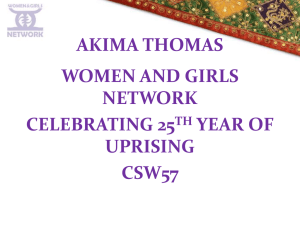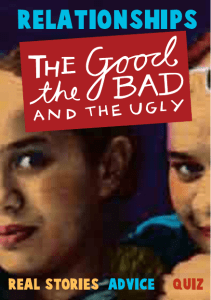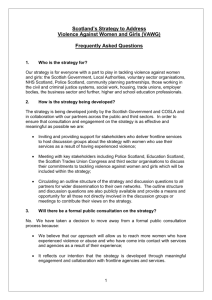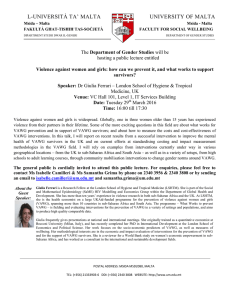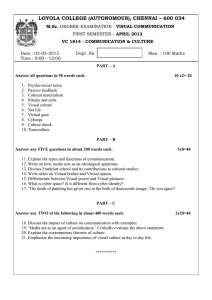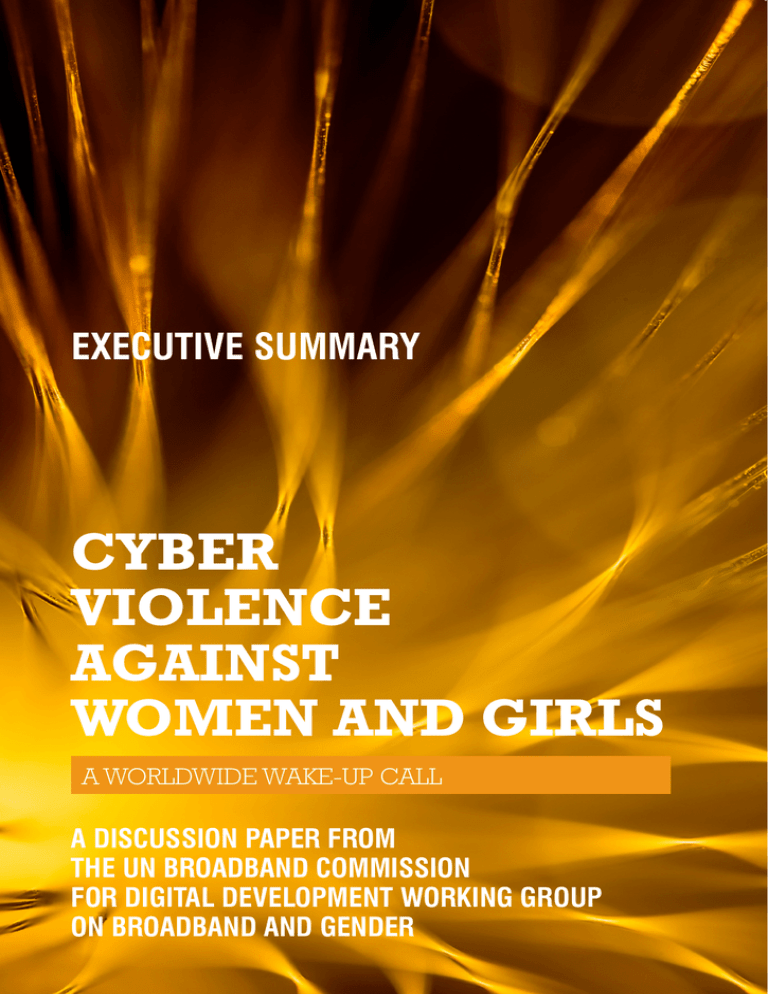
EXECUTIVE SUMMARY
CYBER
VIOLENCE
AGAINST
WOMEN AND GIRLS
A WORLDWIDE WAKE-UP CALL
A DISCUSSION PAPER FROM
THE UN BROADBAND COMMISSION
FOR DIGITAL DEVELOPMENT WORKING GROUP
ON BROADBAND AND GENDER
Acknowledgements
This Discussion Paper has been written collaboratively, drawing on insights and contributions from a range of
Commissioners and Expert Members of the Working Group on Broadband and Gender. It was researched and
compiled by lead author Nidhi Tandon, assisted by Shannon Pritchard, with editorial inputs by teams from ITU, UNDP
and UN Women. Version 2.0 has also benefited greatly from feedback and inputs from a wide range of stakeholders
from academia, the media and others. We are grateful to them for their comments and insights, which have helped us
to considerably improve this paper.
About the Commission
The Broadband Commission for Digital Development was launched by the International Telecommunication Union
(ITU) and the United Nations Educational, Scientific and Cultural Organization (UNESCO) in response to UN
Secretary-General Ban Ki-moon’s call to step up efforts to meet the Millennium Development Goals. Established
in May 2010, the Commission unites top industry executives with government leaders, thought leaders and policy
pioneers and international agencies and organizations concerned with development.
The Broadband Commission embraces a range of different perspectives in a multi-stakeholder approach to promoting
the roll-out of broadband, as well as providing a fresh approach to UN and business engagement. To date, the
Commission has published a number of high-level policy reports, papers, best practices and case studies. More
information about the Commission is available at www.broadbandcommission.org.
Disclaimer
The opinions, analyses and recommendations contained in this report do not necessarily reflect the views of the UN
Broadband Commission for Sustainable Development, the International Telecommunication Union (ITU), the United
Nations Development Programme (UNDP) and its Executive Board, the United Nations Educational, Scientific and
Cultural Organization (UNESCO), UN Women, or of the United Nations Member States.
All rights are reserved. No part of this publication may be reproduced, by any means whatsoever, without the
prior authorization of Broadband Commission co-Vice Chairs ITU or UNESCO. The designations employed and the
presentation of material throughout the publication do not imply the expression of any opinion whatsoever on the
part of ITU and UNESCO concerning the legal status of any country, city or area or of its authorities, or concerning its
frontiers or boundaries.
Version 2.0 updated October 2015
EXECUTIVE
SUMMARY
The main objective of this Discussion Paper is to call attention to emerging trends and to start discussions on the
implications of these trends on efforts to advance gender equality and the empowerment of women in the digital age. This
paper recognizes the wide array of issues related to ‘cyber-violence’ and does not present itself as a full compilation of
those issues or of proposed solutions.
Millions of women and girls around the world are
in the Charter of the United Nations, and, in particular, to
subjected to deliberate violence because of their gender.
the goals of inclusive, sustainable development that puts
Violence against women and girls (VAWG) knows no
gender equality and the empowerment of women as key
boundaries, cutting across borders, race, culture and
to its achievement.
income groups, profoundly harming victims, people
around them, and society as a whole.1
Writing this discussion paper has, in some sense, been a
race to keep up with breaking news, as girl after girl and
The growing reach of the Internet, the rapid spread of
woman after woman, has come forward to expose physical
mobile information and communications technologies
and verbal attacks on them: teenage girls driven to suicide
(ICTs) and the wide diffusion of social media have
by online trolling; an airline passenger using her cell phone
presented new opportunities and enabled various efforts
to record and report physical and sexual harassment from
to address VAWG. However, they are also being used as
a male co-passenger; an actress publicly responding to
tools to inflict harm on women and girls. Cyber-VAWG is
targeted online hate speech against her; a former Major
emerging as a global problem with serious implications for
League Baseball pitcher using doxing3 to identify people
societies and economies around the world. The statistics
responsible for “Twitter troll” posts with obscene, sexually
pose risks to the peace and prosperity for all enshrined
explicit comments about his teenage daughter.
2
1
A current Twitter hashtag4 shows just how rough it is
terms of legal fees, online protection services, and
being a woman on the Internet in North America. Women
missed wages, among others). The direct and indirect
of the Global South also experience various acts of cyber
costs to societies and economies are also significant,
VAWG, but these are usually less well-publicized.
as needs for health care, judicial and social services rise
and productivity goes down with the sense of peace and
High profile incidences attract public attention and tort law
security required for business to thrive. Cyber VAWG can
responses: a Twitter troll was jailed in September 2014
also have adverse impact on the exercise of and advocacy
and a porn site operator sentenced to 18 years in in prison
for free speech and other human rights.
5
in February 2015 . One person was suspended from his
6
community college, and another lost a part-time job with
Perpetrators of VAWG are rarely held accountable, in part
the New York Yankees when the doxing case involving a
due to the relatively low capacity to prosecute offenders.
former Major League Baseball pitcher was made public.
Societal barriers, the limitations of legal recourse and
other factors hamper access to justice for many women,
Responses, however, have yet to fully address the many
particularly for girls and women living in poverty. This
degrees and impact of violence, trauma and loss that
situation exacerbates already low reporting levels and
women, girls and children are routinely exposed to and
spiraling a vicious cycle.
that go unreported. It is a problem of pandemic proportion
when research asserts7 that one in three women will
While fewer women than men access the Internet today,
have experienced a form of violence in her lifetime. Cyber
Intel’s 2013 report, Women and the Web, estimates
VAWG could significantly increase this staggering number,
450 million new female Internet users could come online
as reports suggest that 57% of Americans experiencing
within the next three years. Given the ubiquity of the
harassment online are women.
Internet and its wide-ranging impact, particularly on the
8
younger generation, it becomes imperative to ensure it as
The sheer volume of cyber VAWG has severe social and
a safe place for both current and future generations.
economic implications for women and girls. Threats of
9
rape, death, and stalking put a premium on emotional
The respect for and security of girls and women must
bandwidth and put a stress on financial resources (in
at all times be front and center of those in charge of
producing and providing the content, technical backbone
and enabling environment of our digital society. Failure to
“There is one universal truth, applicable to all countries,
do so will clip the potential of the Internet as an engine for
cultures and communities: violence against women is never
gender equality and women’s empowerment.
acceptable, never excusable, never tolerable.”
The increasing spread of the Internet frames the urgency
for effective legal and social controls on attitudes and
United Nations Secretary-General Ban Ki-moon (2008)
criminal behavior online. In February 2015, Ellen Pao,
2
former CEO of the online forum
In light of the new cyber VAWG
Reddit expressed grave concerns
“Our work to eliminate violence
challenge, the digital
about the tensions between
against women is central to our
world also urgently requires
balancing freedom of expression
with privacy and protection
of Internet users. Rigorous
10
commitment to promote gender
equality and the empowerment of
safety measures to keep up with
a rapidly evolving Internet. This
will necessarily require resources,
oversight and enforcement of
women, both of which are integral
attention and active participation
rules banning cyber VAWG on the
to sustainable development.” of industry (digital gatekeepers),
Internet is going to be a conditio
sine qua non if it is to become a
safe, respectful and empowering
space for women and girls, and
by extension, for boys and men.
civil society and governments.
Helen Clark, UNDP Administrator,
Statement on the International Day for the
Elimination of Violence against Women
(2014)
Governments, regulators, businesses
Third in this multi-level approach
to addressing cyber VAWG are
sanctions, which address laws
as well as the will and ability of the
and everyday netizens alike need to demand and act on
courts and legal systems to enforce compliance and
the basic principle that an unsafe Internet arena will mean
punitive consequences for perpetrators. Establishing
that women will frequent the Internet less freely, with
necessary legal principles is a starting point, before
costly societal and economic implications for all.
striving towards effective implemmentation. Sanctions
however cannot on their own accord, define or set
Sensitization, Safety and Sanctions: a way forward
societal norms, or deter unlawful activity, or remedy
The first imperative in eliminating cyber VAWG is
injuries. The challenge requires a broad-based societal
prevention. Changing social attitudes and norms is the
action, engaging all stakeholders. For this reason, while
first step to shifting the way online abuse is understood
part of the solution, a mere legal reform agenda alone,
as a serious challenge. Violence is not new, but cyber
centered on perpetrators or abusers, would be limited in
violence is, and the public needs to recognize this and
both its reach and impact.
address it as a priority issue. Sensitization to cyber VAWG
must include educating the next generation of ICT users,
Free speech is a fundamental right, and its preservation
both boys and girls, through their parents, teachers and
requires vigilance by everyone, online and offline. Some
wider communities, as well as police authorities and the
suggest that the establishment of a Cyber Civil Rights
justice systems.
Initiative (CCRI) through international collaboration is
necessary to ensure a safe Internet. Others stress that
The second imperative is to put in place and implement
international human rights principles already provide the
safeguards to secure safe online spaces. Over the years,
underpinning for a safe Internet, with the Human Rights
traditional VAWG safety measures have evolved to include
Council’s recognition that human rights apply offline as
women’s shelters, crisis centres, help lines and education.
well as online.11
3
As the Internet evolves and social media and networking
“… the landscape of gender-based violence has been
tools increasingly become an intrinsic part of people’s
transformed … [but] rather than there being a dramatic
lives around the globe, attitudes and norms that
reduction in violence against women, … the challenges have
contribute to cyber VAWG must be addressed with
urgency.
become more complex, the resistance to change deeper,
the backlash against the empowerment of women more
A collective global effort, led by the United Nations
blatant and the methods used to uphold the status quo more
system, has put in place the pillars for a 21st century
sophisticated and insidious.”
sustainable development paradigm.
The Sustainable Development Goals (SDGs), establishing
UN Women (OSCE, 2009)
the global development priorities for the next 15 years,
International and national laws and trans-national
include a goal on gender equality, which places women’s
collaborative alliances are slowly evolving to address
access to technology for their empowerment as one of
common global concerns of cyber VAWG, but if not dealt
the core indicators for progress.
with commensurate to the challenge, crimes committed
are likely to continue to increase, as more of the world
For this to be realized, all stakeholders must take
goes online and these technologies become more and
accelerated actions to ensure a safer, more secure
more a part of everyday life.
Internet for present and future generations – one without
endemic VAWG.
Each of the imperatives of sensitization, safeguards and
sanctions supports the others, and will need consistent,
collaborative action at many levels. Failure to address and
solve cyber VAWG could significantly impede the digital
inclusion of women everywhere.12
Readers might broadly agree that society’s failure to
address gender-based violence and crimes is symptomatic
of a wider social failure to respect and honor each other
regardless of sex, age, creed or race. “Culture is the sphere
where we socialize ourselves – and the Internet – global in
its reach, is a dimension of that sphere”.13
4
END NOTES
1
Please see http://www.who.int/mediacentre/factsheets/fs239/en/, http://www.un.org/en/women/endviolence/index.
shtml and http://www.un.org/en/women/endviolence/factsheets.shtml
2
Please see in particular the various reports of the Broadband Commission at http://www.broadbandcommission.
org/resources/Pages/default.aspx
3
Doxing is the Internet-based practice of researching and broadcasting personally identifiable information about an
individual
4http://www.huffingtonpost.com/2015/05/13/being-a-woman-online-really-sucks_n_7265418.
html?ncid=fcbklnkushpmg00000063
5http://www.telegraph.co.uk/news/uknews/crime/11127808/Twitter-troll-jailed-for-campaign-of-hatred-againstStella-Creasy.html
6http://www.dailymail.co.uk/news/article-3025196/San-Diego-revenge-porn-site-operator-sentenced-18-years.html
7http://www.unwomen.org/en/what-we-do/ending-violence-against-women/facts-and-figures
8http://www.onlineharassmentdata.org/release.html
9http://www.unwomen.org/en/what-we-do/ending-violence-against-women/facts-and-figures
10http://www.washingtonpost.com/opinions/online-feminists-increasingly-ask-are-the-psychic-costs-too-much-tobear/2015/02/19/3dc4ca6c-b7dd-11e4-a200-c008a01a6692_story.html
11http://www.ohchr.org/Documents/Issues/Opinion/Communications/InternetPrinciplesAndRightsCoalition.pdf
12
Please see in particular the previous reports of the Broadband Commission Working Group on Gender at http://
www.broadbandcommission.org/workinggroups/Pages/bbandgender.aspx
13
Rifkin, Jeremy. (2014). The Zero Marginal Cost Society: The Internet of Things, the Collaborative Commons, and
the Eclipse of Capitalism, p.260
5
2015
Photo credit:Shutterstock

